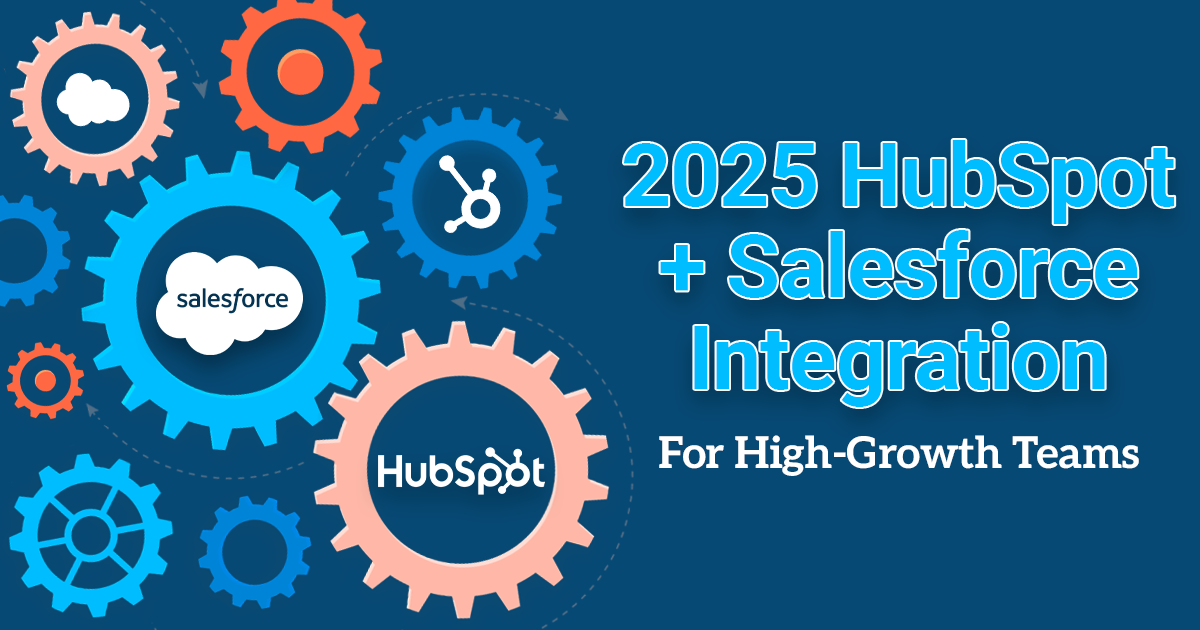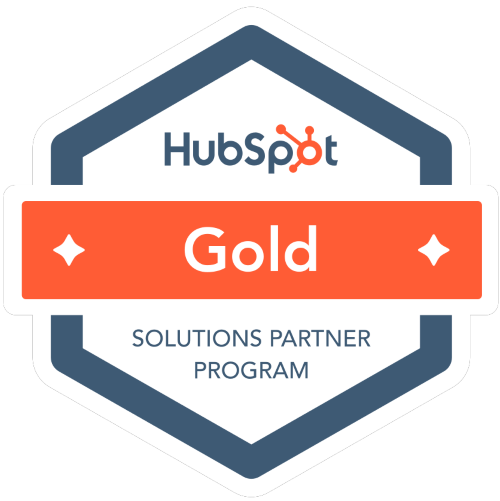HubSpot and Salesforce Integration in 2025: The New Standard for High-Growth Teams

In 2025, your ROI is only as strong as your alignment. The difference between high-growth teams and those who struggle comes down to one factor: integration. When HubSpot and Salesforce are connected cleanly, strategically and intentionally, your marketing and sales teams act as one, powerfully unified in mission and execution.
In this guide, we’ll discover the ways HubSpot and Salesforce integration is no longer a nice-to-have but your market edge, how We Are Working can support that HubSpot strategy as your business’ growth engine and how to maximize your company’s integration value.
Why Sales-Marketing Integration is a Must-Have in 2025
In 2025, successful businesses operate as one cohesive revenue engine rather than independent department silos. Such integration builds sales and marketing alignment, fueling more informed decisions, faster execution and more satisfied customers. Here is how sales and marketing integration benefits both your business and your customers:
The Modern Buyer Demands a Seamless Journey
Buyers today move between channels including social media, email, search and AI. They expect consistent and seamless personalization and integration across their experience. To do so, your sales and marketing systems need to talk with each other to prevent customer journey fractures. In this way, your sales team has visibility on marketing initiatives while your marketing team has real-time feedback on their wins and challenges.
Data Silos Are Killing Growth Potential
Because Salesforce manages deal data while HubSpot captures lead nurturing and campaigns, if these systems talked to each other, it would be a powerful synergy. Data silos create missed opportunities, replicated efforts and team misalignment. Integration ensures a holistic approach from one complete data set.
Integration Enables Real-Time, Revenue-Driven Decisions
Because informed, time-critical decisions are at stake, sales and marketing data-syncing make that a priority. Sales teams can respond faster to an interested lead while marketing teams can optimize converting campaigns in real-time. Integration insights empower your sales and marketing teams to tighten feedback loops that lead to more closed deals faster.

Core Benefits of HubSpot and Salesforce Integration
The value of integrating HubSpot and Salesforce extends beyond sharing data – it empowers a more coherent customer journey. While integration connects systems, our managed We Are Working services connect strategy – ensuring your HubSpot campaigns evolve seamlessly with Salesforce pipeline trends. Here’s how HubSpot and Salesforce integration fuels a faster, smarter and more optimized customer journey:
Unified Customer Profiles Across the Funnel
From first touch to loyal customer, an all-in-one customer profile provides a powerful snapshot of each evolving customer journey. Every touchpoint – from email to contact to form submission – is synced together across the funnel to create data-backed sales and marketing decisions that serve both the customer and the company. This ensures more informed sales follow-up, smarter marketing campaigns and higher conversions at each stage.
Seamless Lead Management and Nurturing
Because each lead counts, another HubSpot Salesforce integration benefit is that such alignment enables marketing to automatically pass qualified leads to sales with confidence. Sales can in turn provide complete feedback to their marketing team about the quality of its campaigns. This cleaner, faster and smarter alignment enables better lead-scoring models, more automated nurture workflows and more responsive customer touchpoints.
Aligned KPIs and Cross-Team Accountability
When you’re integrated and aligned, everyone sees the same metrics so they work more consistently towards the same revenue goals. Marketing can get real-time sales feedback on how effective their campaigns are performing. Sales can double down on conversion-driving messaging.
And leadership can trust its data-backed results with unified reports. These HubSpot Salesforce integration benefits ensure CRM alignment because your lead management tools are working in the best way possible.
How We Are Working Supports Your HubSpot Success
HubSpot Salesforce integration is only the beginning. To ensure you unlock the full benefits of HubSpot success, We Are Working is here for you to help manage your day-to-day CRM, provide expert setup and optimization and ensure your HubSpot and Salesforce integration runs smoothly. Here’s how we can help you grow without the grind:
Expert HubSpot Assistants to Manage Your CRM Day-to-Day
We simplify your CRM by handling campaigns, workflows and HubSpot segmentation while you focus on closing deals and revenue. Trust our HubSpot assistant services to ensure you stay on track with deal flow without needing to hire full-time employees to make it happen.
Custom Setup and Optimization for Seamless Integratio
Whether you handle integration internally or partner with a specialist, our HubSpot experts ensure your platform drives revenue – not headaches. We match data syncs, custom configuration and automation to your sales processes. The result? A seamless match-up between HubSpot and Salesforce that establishes a deeper data alignment that your sales, marketing and leadership teams will value.
Ongoing Support, Reports, and Insights to Fuel Growth
Integration creates a flood of data – but without experts to interpret it, teams drown in details. We turn that data into growth. Depend on our professionals to create on-demand reports based on probing analysis and flag optimization opportunities so you can capture great market share and get ahead of your competition.
How to Maximize Integration Value
Applying the best practices for HubSpot Salesforce integration compounds your impact over time. A successful integration means more than synced systems talking to each other – it’s about aligning your team goals, people and processes towards one unified direction. Here’s how your integration can fuel real outcomes:
Start with Clean Data and Clear Roles
Because unclear and messy data can result in failed alignment, take time to clean up your data by standardizing your contact records, deal stages and custom fields. Also, identifying who owns these inputs and whether sales or marketing is responsible for updating, managing and interpreting this CRM data. By predefining these clear roles and expectations, you run smoother operations that you can depend on.
Automate with Purpose, Not Just for Efficiency
Intentional automation is key to maximizing your integration success. But remember that over-automation can defeat the purpose of choiceful strategy. Because the goal is to optimize precision, focus on automation that benefits the customer journey: effective lead routing, lifecycle stage updates, helpful follow-up reminders and impactful campaign nurturing.
Build Feedback Loops Between Sales & Marketing
A great CRM strategy tip is to create built-in sales and marketing feedback loops. Enable your CRM to drive feedback insights between both teams. Sales should share which types of leads are high-converting and marketing should share which campaigns lead to high pipeline growth. Through consistent check-ins, shared dashboards and cross-team reporting, your business can become more aligned and powerful.

Bonus – What’s Next: The Future of Collaboration
In 2025, the way sales and marketing teams collaborate is fast-evolving. Having a future-ready mindset by taking in these three considerations can power your business growth. Here’s what’s on the horizon beyond HubSpot Salesforce integration:
- RevOps Is Becoming the Standard: Revenue Operations (RevOps) is smashing sales and marketing silos for good by creating end-to-end accountability and harnessing respective team objectives under one complete strategy.
- AI and Predictive Insights Will Lead Strategy: CRMs are no longer recording systems but dynamic intelligence powerhouses. AI-driven tools enable your business to anticipate customer choices, rank leads more effectively and inspire the right touchpoints for each journey.
- Customer-Centric Collaboration Will Define Growth: The most impactful teams will zero in and stay responsive to each customer’s needs. Mission goals, unified data and shared systems will simplify earning loyal customers and long-term business value.
Ready to Turn Your Integration Into Real Revenue?
Integration sets the stage, but growth happens when HubSpot is actively managed to align with Salesforce insights. That’s our specialty. We ensure your integration fuels your goals, teams and growth. Our HubSpot experts manage your everyday CRM details and optimize your systems by ensuring they are aligned and efficient so you can focus on closing deals. Let’s build a smarter, stronger integration that works for your business today.



